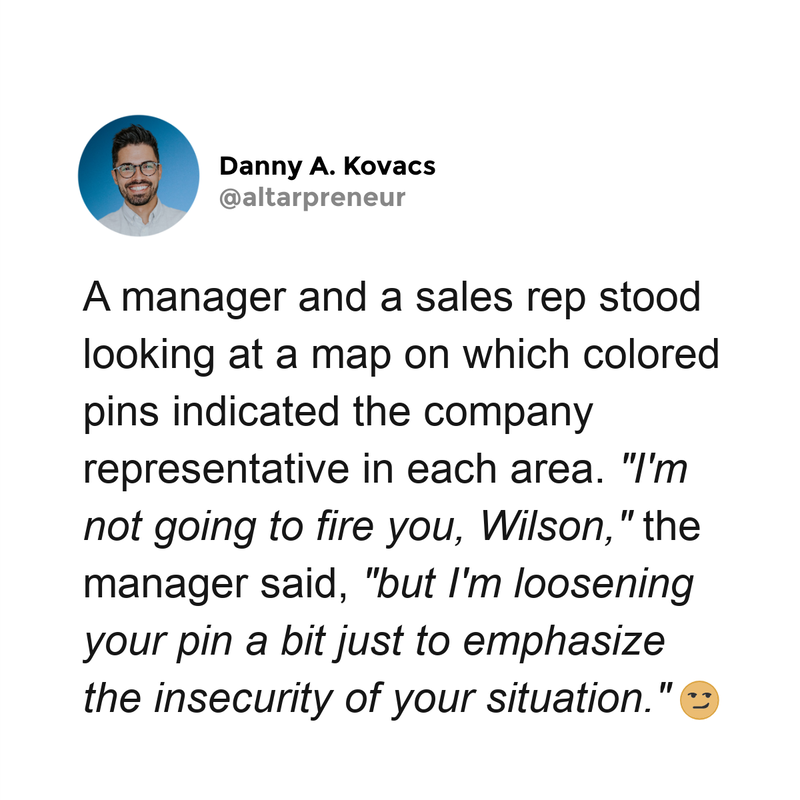|
Burnout is real.
I'm not an expert on the topic but I've experienced enough to know what to look for and how to avoid it. First off, it's important to make the difference between burnout, which typically happens when you're working too much, not getting good sleep, overly stressed, giving your all in too many areas at once, have lost sight of your overall purpose/motivation, etc., and boredom, which happens when you're not being challenged, have too much idle time, disengaged or uninterested, and so on. The problem is not always the problem. For example, instead of changing your job, which you think is stressful, you may just need to get disciplined with a sleep routine, so you can have more energy and focus. Or instead of eliminating a hobby altogether, you just need to keep it to once a week, so you have more face to face time with loved ones. Here are a few activities that have helped me stay balanced in my faith, family, and career (that might be helpful for you too)... Interviewing and exploring new job opportunities is one of the best ways to increase your value in the market.
Let me explain. You don't know what you don't know. When you make time to explore new jobs and see what's available in your current industry, or new industries, you have a chance to sharpen your skills, update your personal brand, and uncover new career opportunities (even if you're not 'looking'). I've experienced this recently and learned some valuable lessons. Here's my short list of 3 things you should do after every interview: 1. Jot down what you learned As you were talking with the hiring manager(s) or company representative, what did you learn? Now that you had a chance to hear more about Company X, Y, or Z, and had a chance to ask questions, what have you found out about upcoming trends, industry updates, new technology, business methodologies, and so on? Make a note of these and go back to review them and learn more by doing some research (dig into the who, what, why, where, etc.). 2. Fill out the Job Opportunity Comparison Matrix With every job/career move, there are emotions involved. The Job Opportunity Comparison Matrix helps you take an objective and collected approach based on a total score from a pre-determined list of criteria such as location, pay, and so on. During my last job search, I came up with this simple Excel sheet, and it worked! What's neat is that the company that I was leaning towards ended up having the highest total score. This is a simple but effective tool to use when you have multiple opportunities and you're stuck on which to choose. 3. Adjust your resume Tweak your resume to include keywords, phrases, tasks, any missing experience that you remembered you have, and so on. You can even save multiple, industry-specific, or role-specific versions of your resume. The idea is to improve it using what you picked up from your last interview, so you can stand out for future opportunities. For example, in one of my interviews, the hiring manager kept bringing up 'cross-functional' work and how important it was in the particular role I was interviewing for. Well, after giving it some thought, I realized I had a lot of experience with cross-functional work, including on a global scale, but I just never identified it on my resume. This was a simple and beneficial addition. Danny They say, "You can't have it all."
I don't know who 'they' are and everyone's definition of 'all' is different. But the reality is, no matter what age, stage and wage you're at, thriving in your family and career doesn't just happen. We need to work. Although the effort and toil of work has been increased ever since sin entered the world, work itself can be honorable, and with God's help, it can be a blessing for your family and the world around you. Like anything else in life, we need to go about family & career with all our heart and do it as unto the Lord. Here are three pillars that I've identified over the years that I use to safeguard against compromise and stress. 1) Define Success Just getting by is a terrible state to be in. In life. In work. In faith. In anything. To thrive, I first need to define ‘success’. What am I aiming for? At the end of this year, what will I have done in family and career to say that it was a successful year? Companies use this method all the time, typically in the form of key performances indicators (KPI's). Here are just a few of my personal 'KPI's' when it comes to defining success. I encourage you to come up with your own, this way it adds an element of accountability.
2) Filter Everything Through Eternity Ask yourself: Will the impact of what I'm doing now matter in eternity? It's something I often ask myself when faced with a financial decision, a matter at work, something related to family or simple actions that I take on a daily basis. Keep the end in mind. Will it really matter, when all is said and done (i.e. you're no longer here), that you drove your family around in a reliable 2012 vehicle rather than a flashy, new sports car? No, it won't. (Plus, your family probably can't even fit in that sports car, so why are you trying so hard.) Will it matter, when all is said and done, that you spent your evenings and weekends preoccupied with work rather than family? Yes, yes it will. The list continues. Do some soul searching and use a filter to keep you from doing things that will negatively impact you and help you do the things that will be beneficial in multiple areas of your life, for years to come. 3) Write It Down I use The Covenant Planner sheet to record our family mission statement, key reminders for the year, key goals and target dates and more. You should try it! This gives me a quick snapshot of what matters and as I review it, usually bi-weekly, it helps me make decisions and guides me back to my non-negotiables. *A Harvard Business Study found out the following related to goal-setting:
What this research made clear is that if you want the best possible results, you need to define your goals and then write them down. The same is true when it comes to success in family and career. Now, the last and most important point (and possibly a prequel to a future post) that I could iterate is this: If you lose at home, you lose. No amount of success in the workplace will compensate for failure in the family. Everything comes back to the definition of success. You CAN win/succeed at both but you need to define what it looks like. If you have some tips of your own for thriving in family and career, send them to [email protected]. Danny (*Source: www.newtechnorthwest.com) Work is a place where we give and we get.
Some days, it feels like we're giving far more than we're getting. Where things go quickly wrong is when expectations are not clear. If employers don't communicate what they expect of their employees (i.e. what they need), how will they know? And vice versa. If employees are not expressing what they really need in order to be fulfilled and productive, the employers have no way of knowing. What employers deceive themselves into thinking they need from their employees is someone who sits at a desk or moves around in a building (aka at work) for 8 to 10 hours a day, looking busy, talking loud or not talking at all (depending on the, dare I say it, culture), shuffling paper, saying 'yes' to everything, moving parts, navigating spreadsheets, and so on. Really, they can probably do many if not all of those things in the comfort of their own home and still be productive. And many employees probably prefer to do so BUT they're not asked or, if they're asked, their employer doesn't really care. All of the above, and more, can soak the creativity out of otherwise creative and driven individuals. Regardless of the size of an organization, employers need to get straight to the point and ask their people: What do you need from me? The sincere ones will tell you. For example, I need clear direction on what my job is, what winning looks like, good pay, and a flexible work schedule built on trust. For me, work is work. It's not family, it's not a place to socialize or boost my ego. Unless you have no other social network I do understand how work can be a place for socializing and connecting. But for many, it's simply something we do and somewhere we go in order to make money. So, get to the heart of the matter. Whether you're an employer or an employee , ask: What do you need from me? Whether you're single and going to school, married and with no children, or a parent who works outside of the home (i.e. a physical building that's not your house), we all have times within the day when we are most focused and least distracted. For some, it is early morning, for others, it is after dinner or sometime in the evening. These are power hours.
They don't come automatically. We need to protect this time. No emails, no social media, nothing that would keep us from focusing on our main task/project at hand, whatever that may be for you. In several places throughout the Psalms, we find mention of the mornings. If you've been to this space a while, you know that I've addressed the importance of the mornings on several occasions. For me, it's an ideal time to get my mind and body focused for the day ahead. Psalm 90:14 - Satisfy us in the morning with your unfailing love, that we may sing for joy and be glad all our days. Psalm 143:8 - Let the morning bring me word of your unfailing love, for I have put my trust in you. My best work is done in the first 2 hours of the day (roughly from 7am to 9am). It's when I tackle important work projects, writing, content creation, family activity planning, study prep, and more. (For more details, check out this post about my morning routine.) How can you get started incorporating power hours into your schedule? 1) Identify your power hours When is the best time for you to get (important) stuff done? When are you most focused? You should be able to identify at least one to two hours every day or, at a minimum, every week, where you can focus on miscellaneous but important tasks or activities. Note: It's not about having time or not having time, it's about making time. We all have 24 hours in a day. We invest our time on things that matter. 2) Protect your power hours Once you've identified your power hour(s), set that time aside. Use it only for the most important, beneficial, or high-return activities. If distractions, emergencies, required and/or important meetings come up, adjust accordingly, then get right back on task. 3) Repeat Make it a habit. Use that time slot every day (or at least during the weekday) and you will begin to see a rhythm to the way you work and an increase in productivity. Danny Disclaimer: The following does not constitute legal and/or financial advice. I am not a financial advisor. These are personal experiences and lessons gathered. Use at your own discretion.
Of the workers who have not asked for a raise from their current employer, PayScale found that men and women reported different reasons for not asking. Men were more likely to say that they haven’t asked because they received a raise before seeking one or because they are happy with their salary. Women were more likely than men (9 percentage points) to say they’re uncomfortable with negotiating salary.* I don't recall ever formally asking for a raise but, thankfully, received a few thus far in my career. I always took the approach that raises are earned, not requested. Sometimes employees can end up looking desperate when they ask. And desperate employees make employers uneasy - Will they leave soon? Can I count on them in the future? Will they stick around for this big project? Etc. If an employer sees the value I bring and is convinced of my dedication, good attitude, competency, etc., they will take the first step in offering a raise. Now, I realize this is not always the case and not everyone thinks this way. If you work at a company that does not give raises or is underperforming and they can't give raises, you may want to consider making a change. There may be times in life when your financial situation is tight and you feel compelled to ask for help. Often, employers can be there to provide some breathing room. But we need to be careful not to fall in the category of employees who think that their employer perpetually owes them something. This is a trap for self-pity and fuels an attitude of hostility towards people who have done you no harm and ignorance towards personal responsibility. Asking an employer for more money is uncomfortable for some people. They don't know where to begin. There will always be emotions involved when discussing pay but the best employees have learned to control their emotions and take a mature, objective and responsible approach. Or...they put themselves in a place where they never have to ask. Here's Why I've Never Asked For A Raise: If you don't know the tangible and intangible skills that you have, you will not know what you're worth in the market and what you need to learn or improve on so that you can grow in your career.
The Skills Inventory helps with this. Take some time to complete the inventory and the Skills SWOT Analysis. Doing this, at least one time per year, will help you see where you're at and where you're going. Altarpreneur Skills Inventory Do all things without grumbling or questioning, that you may be blameless and innocent, children of God without blemish in the midst of a crooked and twisted generation, among whom you shine as lights in the world. (Phil.2:14,15) We are in the middle of a very busy season at work and, to keep it short, it can get frustrating at times. Recently, I found myself grumbling and complaining a few times. Mot of the time it was for little things. Other times it was simply because of the (compounding) workload and some new processes that we have recently implemented in the middle of a large new project.
And then, a shift. I get an unexpected email from my manager. In it, he sends one sentence letting me know that I'm eligible for a bonus and the amount. What!? I didn't even know what to say. I was thankful. Gratitude seemed to replace the grumbling. I knew there were talks about a possible bonus coming but nothing concrete. And what surprised me most was the amount. You know one of the things that came to mind? How foolish I was for all the complaining and grumbling. It got me nowhere. I still had to finish the work. The day still went on. The week passed. Thankfully, I still work from home and none of my co-workers heard me! Daniela reminded me how good the Lord is with us even when we're not so good. The workplace is fertile ground for Evangelism. If you have gotten into a rut at work, I want to remind you of your greater purpose. Jesus didn't come down to earth just to be a human. He had a mission - To seek and save that which was lost (Luke 19:10)! God can use you to impact people who are lost, hurting, depressed, confused, and fearful. But not if your walk and your talk are misaligned. Have the same mindset like Jesus (see 1 Cor.2:16) and embrace the greater purpose of the relationships around you, which are so short-lived in light of eternity. Here are two areas you can focus on this week:
1. True to your word Do what you said you were going to do. Few things will taint your reputation and character at work (and life, in general) as being unreliable in your communication. Speak true of others, don't spread lies. Speak true of yourself, don't make things up to try to impress people. And, most importantly, speak The Truth, God's Word. Psalm 15 begins, "Lord, who may dwell in your sacred tent? Who may live on your holy mountain? The one whose walk is blameless, who does what is righteous, who speaks the truth from their heart." Our walk and our talk must go hand-in-hand. Practically, for example, don't be overly eager to say you'll do something if, deep down, you probably know you won't. Think it through. Integrity of speech; let this infiltrate your character. 2. True to your identity You are a child of God, anywhere and everywhere. Don't be afraid to show it, speak of it, and defend it (if necessary). Don't be someone else. Be you. Instead of fretting over trying to fit in, remember who you are called to be, in Christ Jesus. Colossians 3:1-3 says, "Since, then, you have been raised with Christ, set your hearts on things above, where Christ is, seated at the right hand of God. Set your minds on things above, not on earthly things. For you died, and your life is now hidden with Christ in God." We don't change our behavior, attitudes, convictions, and so on, based on the environment. If anything, the environment around us should change! Before an employee, manager, vice president, etc., you are a living soul on whom God has lavished his love and grace. Live accordingly. Title's pass. Work will be no more. But a child of God you will always be. |
ABOUTBiblical, on-the-go, tips for thriving at work. Written by Danny Kovacs, from first-hand wins & losses. This is the digital space where I share free resources and learning moments throughout the week/month. ARCHIVES
September 2023
TOPICS
All
|
Us |
|










 RSS Feed
RSS Feed